We're Still Human
Did a friend forward this to you? Subscribe here!

A Guide to Practicing Tolerance on Social Media

Bethany, a mother of three children under the age of four, gave up social media for Lent this year. She had done social media sabbaticals for a weekend or a few days, but staying off social media for 40 days was a whole new experience. After 40 days, Bethany felt that social media had a lot less power over her and she felt freed of the social obligations that comes with the territory.
When Lent was over, Bethany decided to return to social media. The world she was living in felt really different, with a global pandemic raging and lockdowns keeping Bethany from connecting with her community. It felt freeing to opt into social media when she wasn’t able to have in-person interactions.
But Bethany was also sick with anger. “After George Floyd’s murder,” she told me, “anger was everything. I lived and breathed anger.” She found that her anger was affecting the atmosphere in her home and realized that something needed to give. In parenting her children, Bethany works hard to validate their emotions and help them find healthy ways to express them. She decided to do to the same with her own emotions, and stewing in anger wasn’t it.
“I used to be part of a fear-induced faith community,” Bethany says, “but I’ve shifted to a faith based in love. I decided that I wanted love to drive my activism—not anger.”
After processing her anger, Bethany decided that she couldn’t live with integrity if she didn’t try to communicate her thoughts on a personal level. As a Christian with liberal values, Bethany sees a variety of perspectives on her social media feeds. She had never been vocal on social media about her faith because she thought it would take too much energy to explain herself and the nuances of her belief. It was freeing to realize that she didn’t have to explain everything; it was still worth it for her to tell part of her story.
Using Facebook, Bethany began pursuing conversations with her community, oftentimes about difficult topics. “I’m not trying to convince anyone,” she said. “I’m just trying to promote an opportunity for understanding and humanization.” Bethany is right when she says that things are becoming increasingly dehumanizing on both sides of the political aisle. As a parent, she is trying to teach her children to listen, but she realized that many adults—including herself—could be a better good job in practicing this skill.
At first, when she started engaging in difficult conversations on Facebook, Bethany noticed that she was constantly defending herself. She began to experiment with different approaches. She has found that she is able to have more productive conversations when she focuses on her motivation to care and respect the person she’s speaking to. If something didn’t get cleared up online, Bethany has gotten into the habit of picking up the phone and checking in with a phone call. “During these phone calls, I didn’t feel defensive, anxious or stressed out. Being motivated by love and wanting to be human changed the interaction by 180 degrees.”
Bethany makes phone calls to friends she is arguing with online in order to validate the importance of the conversation they’re having on social media, but also to remember that there are lots of other conversations that they can have together. “Social media is a real conversation, but it’s not real life. Our whole relationship doesn’t have to be around this big issue. It’s so easy to reduce people, but the truth is, we’re still human.”
Bethany admits that she used to be one of those people who didn’t talk about politics because she thought it was a zero sum game; she wouldn’t be able to change anyone’s mind. “Now I know that I was believing a lie,” she says. “Why can’t I change someone’s mind? So many beliefs are influenced by things we see on social media.”
While we are increasingly politically divided these days, Bethany hopes that these intentional and open-hearted conversations will bring about understanding, curiosity and mutual understanding. “Curiosity as a result is hopeful,” she says. “To pause long enough to wonder about something we haven’t thought about before—that’s a first step.” And that’s what Bethany is looking for: entry points for connection.
“I thought it was impossible to be kind and communicate something that I’m passionate about,” Bethany said. Now, she focuses on finding shared ground. She tries not to use trigger phrases that put people on the defensive and she stays away from oversimplified stereotypes and name-calling. The language she uses is uniting instead of inflammatory and offensive; to her, moderating her language while keeping her ideas clear is a form of maturity and love.
“I don’t talk to people on social media any differently than the way I talk in person,” Bethany says. She’s also aware that people are observing her communication when she responds to someone on a public forum—and they're taking notice. Several friends, like myself, have reached out to Bethany privately, which gives her hope that she’s communicating in a way that honors her truth.
“I don’t run away from discomfort,” Bethany admits. “I love uncomfortable conversations; they mean that I’m stretching. When I get stuck in communication, I return to my core belief that there is always more wholeness and more freedom available.”
Bethany has always been intentional about community, which she views differently from friendship. “I don’t have to share the same intimacy or shared beliefs with my community that I want from my friends. But I need people in my community who don’t agree with me so I can stay empathetic.”
Above all, she is not interested in burning bridges with people who share different beliefs than she does, and she makes a good point: “If you don’t keep people in your life who disagree with you, you’re not going to make friends with those kinds of people are you get older.” Bethany values keeping her community diverse and staying connected with them in meaningful ways. “We influence each other in ways that promote curiosity and reason around these topics.”
“Everyone has different reasons for using social media: venting, celebrating. For me right now, I want to be helpful. I don’t think the way I’m doing it is better; this is what’s in my lane right now.”
Tip of the Week
What's in your lane these days when it comes to making the world a better place?
We each have gifts we can call on; what's yours?
If you enjoy this newsletter, please
Thanks for reading!




